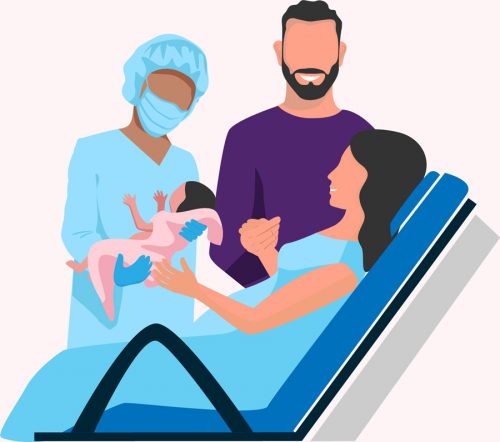


“Every labor and delivery is unique. Even the same woman can have a very different labor and birth experience with each pregnancy.”
– Elikem Amable, CNM, certified nurse midwife at Henry Ford Health.
Although the chances are slim, there is a 4% possibility that your baby will be born with a birth defect. This includes major conditions as well as the thousands of other anomalies, many of which are minor and unimportant such as a toe problem or a small heart defect that goes away quickly after delivery without creating any health problems.




If your child is born with any congenital abnormalities (birth defects), there is a good chance they will never be able to obtain health or life insurance.
The most essential benefit of maternity insurance is that it ensures future insurability for your kid – even if they are born with a problem – without any medical underwriting.


Some mothers go into labour early, and their newborn enters the world unprepared to tackle the trials of their first year.
A premature birth occurs when the infant is born more than three weeks before the expected due date, which is before the 37th week of pregnancy.
1 out of 10 newborns are born prematurely in Singapore
Premature newborns miss out on the last weeks of development in the womb when the brain and other important organs are completely grown which prepares them to live outside the womb.
As a result, premature newborns are likely to require extended hospital stays and they may also experience health issues.
In Singapore, 1 out of every 5 newborns have a problem that necessitates NICU (ICU for newborns) treatment. For parents who are not adequately prepared, this can be quite costly. The rate of prematurity in Singapore has risen from 7.2 percent to 9.5 percent in the last several years.

• Drug or alcohol exposure
• Hypertension (high blood pressure)
• Bleeding
• Age younger than 16 or older than 40 years
• Multiple pregnancies
• Premature rupture of the amniotic sac
• Sexually transmitted diseases
• Breech delivery (buttocks delivered first)
• Fetal distress/ birth asphyxia (due to lack of oxygen)
• Forceps or C-section
• Presence of meconium (baby’s first stool) in the amniotic fluid
• Nuchal cord (umbilical cord around baby’s neck)
• Birth at gestational age less than 37 weeks or more than 42 weeks
• Birth weight less than 2,500 grams or over 4,000 grams
• Seizures
• Hypoglycemia
• Medication or resuscitation soon after delivery
• Infection such as chlamydia, herpes or group B streprococcus
• Birth defects
• Need for extra oxygen or monitoring, medications or intravenous (IV) therapy
• Need for special procedures such as a blood transfusion


You can ask to be downgraded, which will result in all charges being downgraded too. Your request will usually be processed on the same day you request for it.

If you know in advance that your baby will probably spend time in an NICU, choose a public hospital to give birth at.




What is Maternity Insurance? Maternity insurance provides coverage for both mum and child throughout the course of pregnancy, and even shortly after birth. It offers a lump-sum payout or daily hospital cash benefit to offset medical costs incurred in the event of a complication.
If you want to buy or upgrade your Integrated Shield Plans (IP) to acquire pregnancy complications coverage because you’re pregnant or expecting to get pregnant, keep in mind that there’s a 10-month waiting period, so your planned delivery is unlikely to be covered.
Even if you have completed the waiting time, an IP’s coverage is typically restricted, covering only a few of the mentioned issues at most. Hospital charges for unlisted pregnancy problems will not be covered in such circumstances. Maternity insurance is designed to address the unique problems of pregnancy and delivery.
Most crucially, an IP only protects the mother, leaving the infant unprotected. If something happens to your baby, you’ll need to come up with more money to cover the costs. Maternity insurance provides your child with insurance coverage without medical assessment or underwrting.
Buying maternity insurance will help offset these extra costs and give you more financial security.
Continue Reading: The Maternity Project